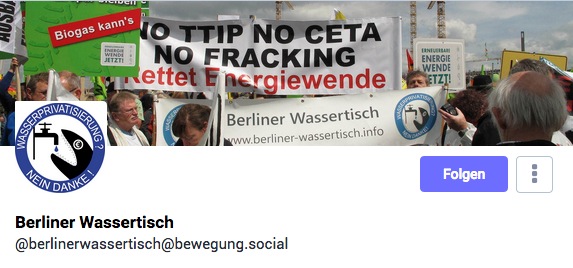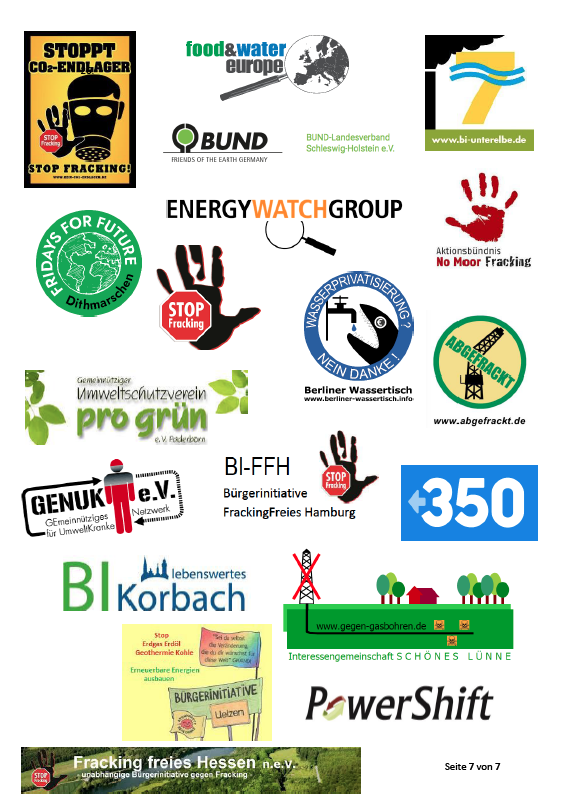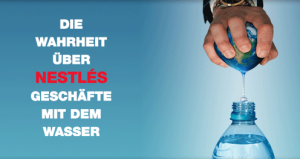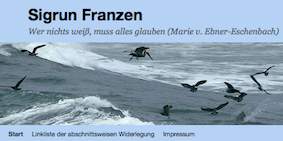Privatsphäre stärkt, Überwachung schwächt! #StopScanningMe

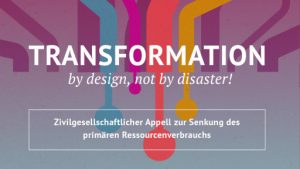
Suche

Schiefergas-Fracking in Deutschland?
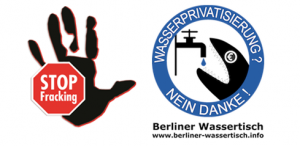
#StopEUMercosur Erklärung
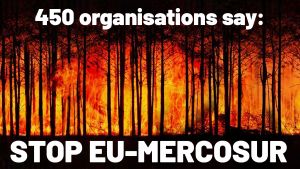
Aktion Greenpeace: #StopEUMercosur

#SaveTheOkavangoDelta
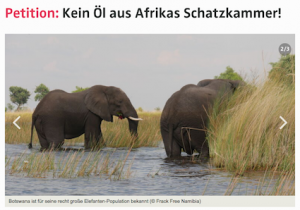
Erfolgreich! Über 1 Million Unterschriften „Green Deal“ – Europäische Bürgerinitiative (EBI)
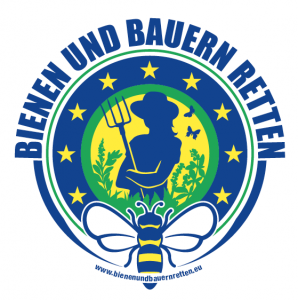
Stop Energiecharta. #NoECT. Wir wollen raus aus dem Anti-Klimaschutz-Vertrag
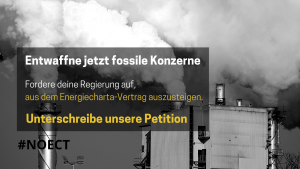
Europäische Bürgerinitiative gegen biometrische Massenüberwachung (17.2.2021-17.2.2022)
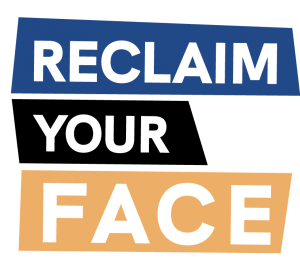
Lebensgefährliche Entwicklung: Gewinnorientierung im Krankenhaus
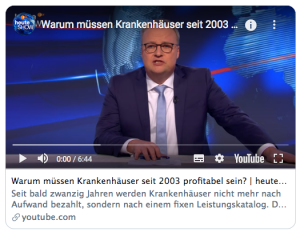
- Wassertisch-Plenum,
im NewYorck / Bethanien Mariannenplatz 2A
10997 Berlin Openstreetmap fällt coronabedingt aus Überblick (Messstellen: Oberflächengewässer und Grundwasser)

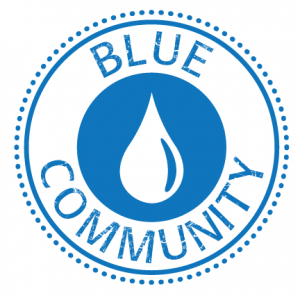
-
Letzte Beiträge
- AöW zum Weltwassertag 2023: Interkommunale Zusammenarbeit noch stärker ermöglichen
- Greenpeace: Fracking – eine unterirdisch schlechte Idee
- Bürgerinitiative gegen CO2-Endlager: Offener Brief an den Bundesminister für Wirtschaft und Klimaschutz Dr. Robert Habeck
- BUND gegen CCS-Endlager
- Jürgen Knirsch: CETA-Handelsabkommen: Eine trügerische Wette auf die Zukunft (Leserbrief an die SZ vom 8.12.2022)
- Neuere Materialien und Dokumente zur CETA-Debatte
- TAZ: Hamburger Abgeordneter über Olympia-Gedankenspiele: „Es kommt zu Vertreibungen“
- NDR: Bewirbt sich Hamburg noch einmal um Olympische Spiele?
- NGO-Bündnis fordert mit gemeinsamen Appell die Senkung des absoluten Ressourcenverbrauchs
- Allianz der öffentlichen Wasserwirtschaft warnt vor CETA: Mit dem jetzigen CETA-Text wird der Schutz der öffentlichen Wasserwirtschaft vor einer Kommerzialisierung weiter geschwächt
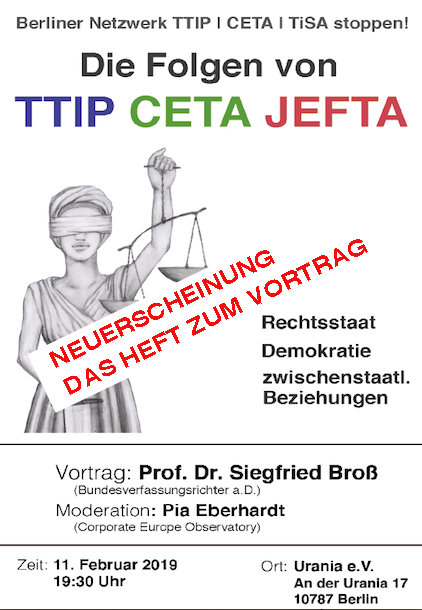
Delius-Klage
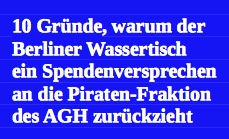
Keine Steuergelder für LNG-Fracking-Gas Terminals in Deutschland!
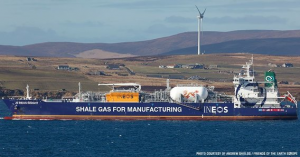
RSS-Feeds
Schlagwort-Archive: Menschenrecht Wasser
FIAN: Online seminar: Guidelines on the Right to Water for Africa
26.03.2021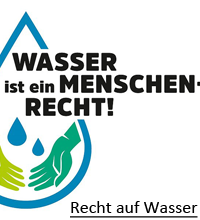
Online seminar: Guidelines on the Right to Water for Africa
In July 2020, the African Commission on Peoples’ and Human Rights (ACHPR) has adopted the Guidelines on the Right to water for Africa to advance the human right to water all over Africa.
Datum: 26. 03. 2021 14:00 – 15:00
Ort: Online
The Guidelines have been developed on the concern that
- an estimate of 300 million people in Africa live in a water-stressed environment,
- water grabbing is on the rise,
- water is more and more polluted by industry,
- climate change already imposes a significant impact on human populations, ecosystems and the physical environment,
- many jurisdictions still work on the basis that the right to water is not justiciable.
What is the content of the guidelines? How can they be implemented in conflicts on water? How do they make the human right to water justiciable? How could they be used by civil society organisations working on development issues in African countries?
These questions and more will be discussed during the online-seminar. The seminar will be conducted in English.
Please register here: https://attendee.gotowebinar.com/register/5076234492239606032
Zur Website
Wasserprivatisierung. NDR: Lüneburg: Ärger um Pumpversuch von Coca-Cola
NDR
3. Februar 2021
Lüneburg: Ärger um Pumpversuch von Coca-Cola
Probeweise durfte der Getränkehersteller erstmals Wasser aus dem Brunnen fördern – begleitet von Protesten.
Zum Bericht
Verfügbar bis 03.02.2022
Vgl. dazu Bürgerinitiative Lüneburg Unser Wasser: „Im Januar 2020 wurde Unser Wasser in Lüneburg – Bürgerinitiative zur Rettung des Trinkwassers von Dr. Bettina Schröder-Henning und Cornelia Hoellger gegründet. Anlass war der Antrag von Coca-Cola-Apollinaris-Brands, für die Marke Vio weitere 350.000 Kubikmeter Wasser aus dem Tiefengrundwasser, das besonders schützenswert und rein ist, zu entnehmen. Mit weiteren Wasserschützer*Innen wurden die Öffentlichkeit und die Politiker auf die zunehmende Dürre auch in unserer Region und die damit verbundene geringere Grundwasserneubildung etc. hingewiesen.
Die industrielle Nutzung des kostbaren Tiefengrundwassers über lange Zeiträume für nicht nachhaltige Zwecke und zu einem sehr geringen Preis ist angesichts der Endlichkeit dieser Ressource nicht hinnehmbar.
Wir, die Mitglieder der BI sind in jeder Hinsicht unabhängig. Wir arbeiten an den geologischen, klimatologischen, rechtlichen und politischen Fragen in Zusammenhang mit der Situation der Wasserwirtschaft, vor allem aber mit der künftigen Sicherstellung unseres Trinkwassers vor dem Hintergrund des Klimawandels.“
Zur Website
Fracking verschmutzt jedes Jahr Unmengen von Wasser in British Columbia (Kanada). Tweet des Tages
.@christyclarkbc @jjhorgan @AJWVictoriaBC Protecting the #right2water means banning #fracking in #BC. #bcelexn17 pic.twitter.com/s3RPMpNoXw
— Council of Canadians (@CouncilofCDNs) May 5, 2017
Veranstaltung: Das Menschenrecht auf Wasser – Vision oder Illusion?
 29.10.2015, 17:30–21:00 Uhr, Ort: Claire-Waldoff-Str. 7, 10117 Berlin, Haus der Land- und Ernährungswirtschaft, Konferenzraum 1, (openstreetmap)
29.10.2015, 17:30–21:00 Uhr, Ort: Claire-Waldoff-Str. 7, 10117 Berlin, Haus der Land- und Ernährungswirtschaft, Konferenzraum 1, (openstreetmap)
weiterlesen
Erfolg für Menschenrecht auf Wasser (#right2water)!
UPDATE 25.06.2015
Vorhin hat der Umweltausschuss des Europäischen Parlaments den #right2water-Entwurf mit 38:22 angenommen. Darüber freuen wir uns sehr und bedanken uns bei allen, die dem Menschenrecht Wasser zum Erfolg verhelfen!
Im September (zwischen 7-10.) findet die endgültige Abstimmung im Europaparlament statt.
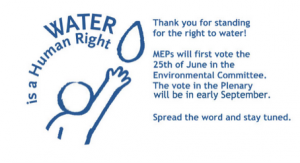
Hier das Statement von Right2water:
European Parliament Environment Committee formally supports Human Right to Water
Donnerstag, Juni 25, 2015 – 15:46
(25 June 2015) This morning the Environment and Public Health Committee together with the Development one voted by an absolute majority to send a strong message to the European Commission to act on the Human Right to water.
The Report by the Irish MEP Lynn Boylan (GUE/NGL) was voted and it will be discussed and voted in the Plenary. The report demands the EC to act on the first successful European Citizens Initiative implementing the Human Right to Water in the EU legislation as defined by the United Nations in 2010. It also calls not to push for privatization of water through austerity measures and to promote more actively Public Public Partnerships (PuPs). It also reinforces the exclusion of water and sanitation of the internal market rules (as the Communication of the EC stated) and from any trade agreement.
We want to thank all the MEPs that listen to the voice of over 1.8 million citizens that signed the ECI
Zum Beitrag
Unser Bündnis fordert: Das Menschenrecht auf Wasser und sanitäre Versorgung muss in die Entwicklungsziele der UN aufgenommen werden!
Das Menschenrecht auf Wasser und sanitäre Versorgung muss in die Entwicklungsziele der UN aufgenommen werden!
Hier ist der Text, den unser Bündnis von 296 Unterzeichnern am 13. Juni 2014 auf den Weg gebracht hat:
The urgent need to protect and promote the human right to water and sanitation in the UN Sustainable Development Goals
Dear Ambassador,
we, the undersigned organizations, urge the General Assembly’s Open Working Group on the Sustainable Development Goals to explicitly affirm its commitment to protect and promote the human right to water and sanitation within the SDG framework and implementation. We join the repeated and insistent calls from civil society around the world to ensure that the SDGs are explicitly aligned to the human rights framework.
Many of us have actively engaged in the Rio+20 process and have carefully followed and advocated in the General Assembly’s Open Working Group on the Sustainable Development Goals since March 2013. We are deeply troubled that despite our clear and urgent call in May 2014 the Zero Draft (June 2, 2014) has failed to include an explicit reference to the human right to water and sanitation.
For the post-2015 development agenda to reach its objective of being just, people-centered and sustainable, the goals must prioritize—for present and future generations—the human right to water for health, life, food, and culture over other demands on water resources. This is even more critical given the key role of water for achieving other sustainable development objectives such as sustainable energy and food production, gender equality, and climate change mitigation.
The SDGs must be designed to catalyze increased capacity and political will for States to fulfill their legally binding obligations to respect, protect and promote the human right to water and sanitation. In 2010, the UN General Assembly recognized “the right to safe and clean drinking water and sanitation as a human right that is essential for the full enjoyment of life and all human rights.” (Resolution 64/292, para. 1). This important recognition by UN Member States ratified existing international law at the time as interpreted by the UN treaty bodies.
The Convention on the Elimination of All Forms of Discrimination Against Women provides that State parties shall ensure to women the right to “enjoy adequate living conditions, particularly in relation to […] water supply”, (Article 14(2)). The Convention on the Rights of the Child requires parties to combat disease and malnutrition “through the provision of adequate nutritious foods and clean drinking water”, (Article 24(2)). Persuasively, the Committee on Economic, Social and Cultural Rights concluded that the right to water is essential for securing an adequate standard of living and “inextricably related to the right to the highest attainable standard of health” (General Comment No. 15, para. 3).
However, our organizations fear that the human right to water and sanitation continues to be contested within the context of a global competition for scarce water resources. We are concerned that a development agenda that is not explicitly committed to upholding this vital human right may end up undermining it.
A failure to explicitly name this right in the SDG agenda would be a setback in the progress that UN Member States have made in elevating the recognition and protection for this fundamental human right.
We therefore respectfully call on you to show leadership and commitment to the human right to water during the upcoming sessions of the GA’s Open Working Group on the SDGs.
We urge you to insist on a human rights-based approach that:
a) explicitly names the right to water and sanitation in the goal on water and sanitation;
b) aligns targets to the human rights framework and guarantees non-discrimination, accountability, and public participation in decision-making.
Thank you for your consideration of this important concern. We look forward to continuing this dialogue during the upcoming 12th session of the Open Working Group.
Sincerely
[296 Unterzeichner]
Vgl. dazu den Beitrag von
The Council of Canadians:
SDGs Must Recognize Human Right to Water and Sanitation
zum Artikel
Right2water: Human Right to Water and Sanitation must be in SDGs!
Right2water
10.06.2014
Deutsche Übersetzung (Wassertisch)
Human Right to Water and Sanitation must be in Sustainable Development Goals (SDGs)!
We have campaigned successfully together to get the human right to water and sanitation implemented in European law. Now we ask you again to act with us to ensure that the human right to water and sanitation is included in the Sustainable Development Goals (SDGs)!
The zero draft document which was released last week does not contain any reference to the human right to water and sanitation. We are happy to see that there is a separate goal for water and sanitation. This was one of our suggestions in the ECI “right2water”. But a “voluntary” goal is not enough to ensure achievement of “water and sanitation for all”. Including the human right to water and sanitation makes a difference.
We think the goal “water and sanitation for all by 2030” can only be achieved by a binding commitment. We have seen the result of the (also voluntary) MDGs that claimed a success for water but was a complete failure for the sanitation goal. Moreover there is a clear difference between a Goal and a Human Right. If it is only a Goal, then governments can endlessly say: “We tried”, “we did our best”, but there is always an excuse if the goal is not achieved. A Human Right puts an obligation to governments, and these governments can be held accountable by people for fulfilling their obligation. A Human Right is empowering people to stand up for their Rights. A Goal does not empower people.
The SDG process will determine the official international development agenda for the next 15 years. Given that the MDG process failed drastically in the area of sanitation and given that MDG targets on drinking water failed to prioritize the needs of the most vulnerable and marginalized communities, it is vital that the same mistakes are not repeated within the SDG process. The human right to water and sanitation obliges governments to prioritize the most vulnerable and to use all means available to realize this right for all. Furthermore, we feel that the HRTWS will be an important tool in our struggle to prevent the SDG agenda from being co-opted to promote greater corporate access to water resources and services.
Please join us in our call by:
1. Signing your organization onto the attached letter by June 12th at noon EST by sending an email to SDGrighttowater@gmail.com
2. Circulating the letter within your networks and ask them to sign on by sending an email to SDGrighttowater@gmail.com too!
3. Forwarding a copy of the letter to one or more ambassadors representing a European country at the UN (available in French, Spanish and Portuguese, list of UN Ambassadors, all in attachment).
4. Tweeting the need for #owg12 to explicitly name the right to water and sanitation in the #SDGs.
Übersetzung ins Deutsche durch Wassertisch:
Das Menschenrecht auf Wasser und sanitäre Versorgung muss in die Nachhaltigen Entwicklungsziele (SDGs) der UN aufgenommen werden!
Wir haben erfolgreich zusammen eine Kampagne durchgeführt, um das Menschenrecht auf Wasser und Sanitärversorgung in europäisches Recht umgesetzt zu bekommen. Jetzt bitten wir Sie wieder, zusammen mit uns zu handeln, um sicherzustellen, dass das Menschenrecht auf Wasser und Sanitärversorgung in die Sustainable Development Goals (SDGs) [= nachhaltige Entwicklungsziele] einbezogen wird!
Das erste Entwurfsdokument, das dazu letzte Woche veröffentlicht wurde, enthält keinerlei Hinweis auf das Menschenrecht auf Wasser und Sanitärversorgung. Wir freuen uns aber, dass ein besonderes Ziel für Wasserversorgung und Abwasserentsorgung benannt wird. Das war nämlich einer unserer Vorschläge in der EBI „right2water“. Ein „freiwilliges“ Ziel reicht jedoch nicht aus, um „Wasser-und Sanitärversorgung für alle zu gewährleisten.“ Die Einbeziehung des Menschenrechts auf Wasser und Sanitärversorgung macht dabei den Unterschied aus.
Wir denken, dass das Ziel „Wasser-und Sanitärversorgung für alle bis 2030“ nur durch eine verbindliche Zusage erreicht werden kann. Wir haben das Ergebnis der (ebenfalls freiwilligen) Millenniums-Entwicklungsziele (MDGs) gesehen, die einen Erfolg für Wasser reklamierten, aber einen kompletten Fehlschlag für das Ziel der Sanitärversorgung darstellten. Darüber hinaus gibt es einen klaren Unterschied zwischen einem Ziel und einem Menschenrecht. Wenn es nur ein Ziel darstellt, dann können die Regierungen immerzu sagen: „Wir haben es versucht“, „wir taten unser Bestes“, aber es gibt immer eine Entschuldigung, wenn das Ziel nicht erreicht wird. Ein Menschenrecht stellt eine Verpflichtung für Regierungen dar, und von diesen Regierungen kann das Volk Rechenschaft verlangen, ihre Pflicht zu erfüllen. Ein Menschenrecht ermächtigt Menschen dazu, sich für ihre Rechte einzusetzen. Ein Ziel kann das nicht leisten.
Der SDG-Prozess wird die offizielle internationale Entwicklungsagenda für die nächsten 15 Jahre bestimmen. Angenommen, der MDG-Prozess scheitert dramatisch im Bereich der Sanitärversorgung und angenommen, die MDG-Ziele zur vorrangigen Befriedigung der Bedürfnisse der der am stärksten gefährdeten und marginalisierten Kommunen scheitert ebenfalls, dann ist es wichtig, die gleichen Fehler innerhalb des SDG-Prozesses nicht zu wiederholen. Das Menschenrecht auf Wasser und Sanitärversorgung verpflichtet Regierungen, Prioritäten zugunsten der am meisten Gefährdeten zu nutzen und alle zur Verfügung stehenden Mittel einzusetzen, um dieses Recht für alle zu realisieren. Darüber hinaus glauben wir, dass die HRTWS ein wichtiges Instrument in unserem Kampf sein wird, die SDG-Agenda von einem stärkeren Unternehmenszugang zu Wasserressourcen und Dienstleistungen frei zu halten.
Bitte unterstützen Sie uns bei diesem Aufruf:
1. Unterzeichnen Sie als Organisation den beiliegenden Brief bis zum 12. Juni mittags EST, indem Sie eine E-Mail an SDGrighttowater@gmail.com schicken
2. Verbreiten Sie den Brief innerhalb Ihrer Netzwerke weiter und bitten sie darum, den Brief zu unterschreiben, indem Sie eine E-Mail an SDGrighttowater@gmail.com schicken!
3. Leiten Sie eine Kopie des Schreibens an einen oder mehrere Botschafter weiter, die ein europäisches Land bei der UNO repräsentieren. (Brief verfügbar in Französisch, Spanisch und Portugiesisch, sowie Liste der UN-Botschafter, alle im Anhang).
4. Twittern Sie, dass es für #owg12 notwendig ist, das Recht auf Wasser und Sanitärversorgung explizit in den #SDGs zu benennen.

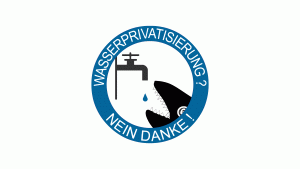
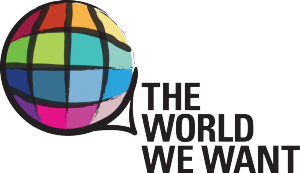


 Pressemitteilungen
Pressemitteilungen